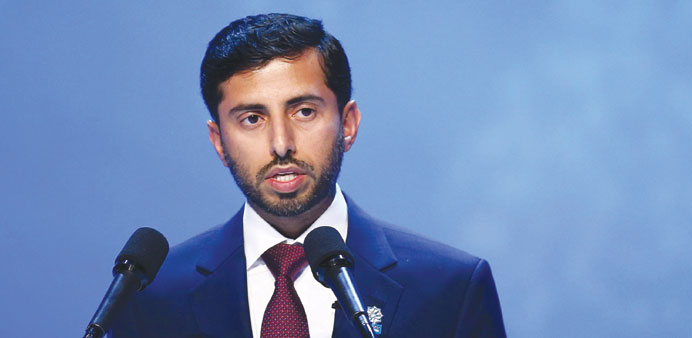Bloomberg
Daegu, South Korea
The UAE, Opec’s fourth-largest crude producer, is investing in nuclear power, renewable energy and liquefied natural gas terminals to reduce its reliance on oil, according to its energy minister.
“We are making our energy-supply portfolio more robust,” Suhail Mohamed al-Mazrouei (pictured) said in Daegu, South Korea, yesterday. “We are committed to being a reliable supplier of hydrocarbons to the world,” he said, adding that the nation is operating a cross-country crude pipeline to facilitate exports.
Abu Dhabi, holder of most of the UAE’s crude reserves, plans to raise output capacity to 3.5mn bpd in 2017 to meet export demand and feed an expanded local refinery. The emirate supplies parts of the country with gas imported from Qatar and from its own fields and provides electric power to other emirates.
Abu Dhabi and Dubai, the second-biggest emirate, are also investing in renewable energy.
“Traditional sources of energy on their own are not enough,” al-Mazrouei said at the World Energy Congress. “The UAE is actively diversifying its energy mix.”
The UAE plans to generate 25% of its power from nuclear plants by 2020 and to have 2,500MW of generation capacity from renewable sources, according to the minister. Four nuclear plants will produce 5,400 MW of power when completed by 2020, Matar Hamed al-Neyadi, an energy ministry undersecretary, said at the conference yesterday. Renewable energy will account for about 7% of the nation’s generation, he said, indicating the UAE will have a capacity of more than 35,000 MW by 2030.
Abu Dhabi last year started a crude pipeline to Fujairah, a port outside the Strait of Hormuz, a choke point for oil shipments from the Gulf. Two Abu Dhabi state-owned investment vehicles plan to build an LNG import terminal in the emirate to bring in more of the fuel for power generation.
The UAE, which has boosted its oil-production capacity to about 3mn bpd, will proceed with plans to raise its total daily output capability to 3.5mn barrels even amid increased supply from US shale resources and from Middle East producers including Iraq, al-Mazrouei said on Sunday.

